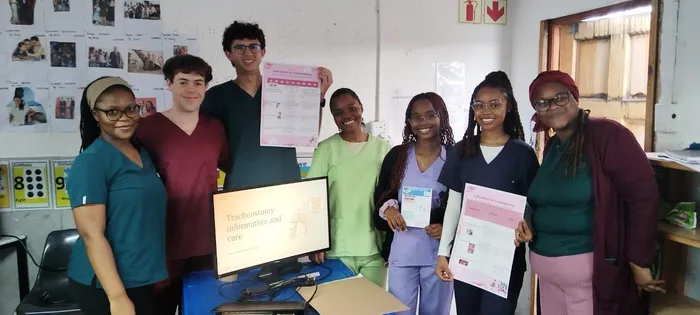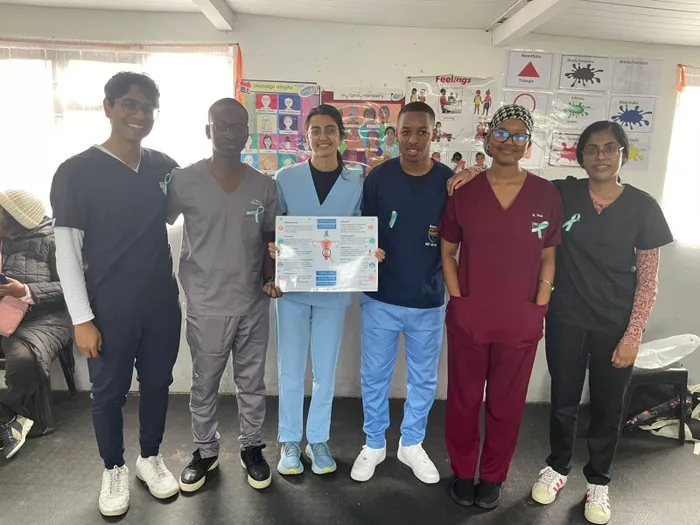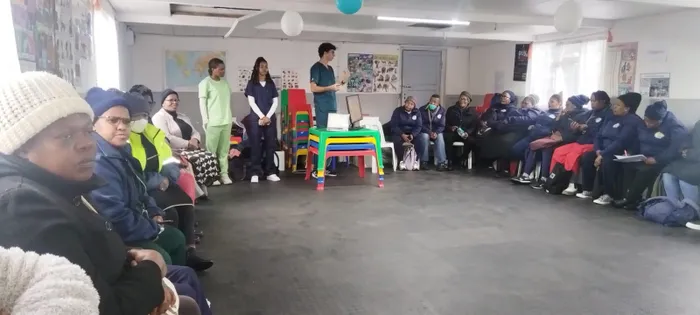UCT students empower Langa caregivers with cervical cancer and tracheostomy workshops

The Wednesday group of students on tracheostomy were Koketso Matela, Brett Brachmayer, Dylan Brugman, Queen Matodzi, Dineo Mafetsa, Patience Mojapelo, and facilitator Patricia Ncamile.
Image: Phiri Cawe

Aamena Patel, Shariqsrijon Sinha Ray, Zuko Bhana, Siphamandla Nhlapo, Aiswarya Mathew and Mokgadi Phasha were the first group that taught homebased carers about cancer and cervical cancer.
Image: Phiri Cawe

Thirty home-based carers had an opportunity to learn from the University of Cape Town students last week.
Image: Phiri Cawe
Fourth-year medical students from the University of Cape Town (UCT) held a two-day workshop on cervical cancer and tracheostomy care for 30 Langa community caregivers last week, on Tuesday and Wednesday, June 17 and 18, at Ikhaya Labantu.
Tracheotomy, or tracheostomy, is a surgical airway management procedure that consists of making an incision on the front of the neck to open a direct airway to the trachea.
The workshops form part of the students’ ongoing educational programme, which involves engaging communities on health-related topics. Caregivers and students discussed the impact of these conditions in the area and the challenges faced by individuals affected.
The students said Langa continues to face various health challenges that require urgent attention.
Aamena Patel said the workshop focused on explaining what cancer is, including its causes, risk factors, treatment options, and how pap smears work.
She said the aim was to help community caregivers understand how to prevent cervical cancer, particularly through HPV vaccinations for young girls and routine pap smears for women. The session also included information on how to care for individuals with terminal cancer.
Ms Patel said that after several visits to Langa and engaging with residents, it became clear that cancer, especially cervical cancer, remains a serious health concern in the area.
Another student, Dylan Brugman, led the session on tracheostomy care.
He said they decided to support caregivers in Langa after learning that many are involved in decisions about tracheostomy procedures for patients. He said the workshop highlighted the need to consider factors beyond the medical procedure, such as quality of life, personal values, and long-term care planning.
He said to promote health, the existing myths about tracheostomy in society could be holding back the progress of patients.
Another student, Bret Harris, said caregivers, the community, and family members can do a lot to dispel the myths about tracheostomy and help those patients have confidence in themselves.
The students worked with four non-governmental organisations (NGOs) such as Nkanyezi, Sizamile, Kheth’impilo, and Ikhaya Labantu.
After a successful day of learning about cervical cancer and busting myths about tracheostomy, the caregivers, who were eager to learn, commended the students.
Thozama Ngcoza said that, after the workshop, she was more confident to help patients than before. She said the students were clear about what they were teaching them.
“I can deal with stigma very well now. I can also be a doctor to my patients,” she said.
Another home-based carer, Zolani Tsolekile, said it was important to learn about these issues to be able to combat misperceptions from the community members.
“We have learned a lot from them. Some of the issues I was not aware of. But I can safely say, I am well taught by these students,” he said.
UCT coordinator Patricia Ncamile said these services serve the community in the townships like Langa and Bonteheuwil quite well.
Ms Ncamile said that in these years they have tried to take students to these areas. She said they have a very good relationship with the public and also thanked them for supporting their students.
Related Topics: